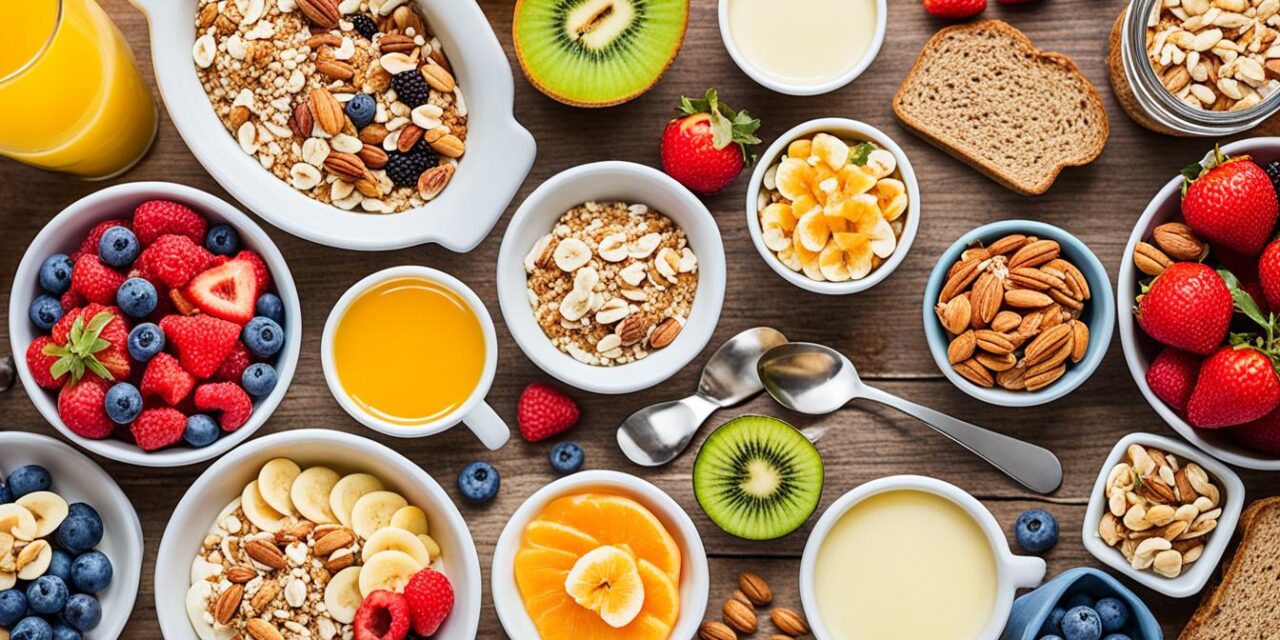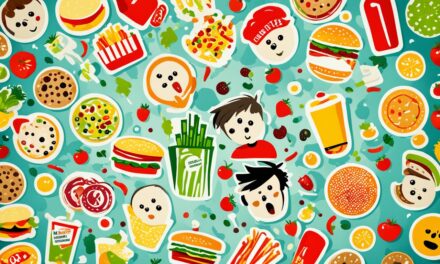Imagine this: it’s a busy Monday morning, and you’re running late for work. The only thing on your mind is grabbing a quick breakfast to fuel your day. You reach for your go-to breakfast option, a seemingly innocent and popular choice that you’ve been enjoying for years. But little do you know, this breakfast food may be sabotaging your efforts to maintain a healthy diet and achieve your weight loss goals.
So, what is this mysterious culprit? It’s none other than sugary cereal – the breakfast staple that many of us grew up with. That colorful, crunchy bowl of sweetness may be enticing, but it’s loaded with hidden sugars, refined grains, and artificial additives that can wreak havoc on your body.
While it’s easy to fall into the habit of starting your day with a bowl of sugary cereal, it’s important to be aware of the negative impact it can have on your nutrition and overall health. By making a few simple swaps, you can turn your mornings around and set yourself up for success on your journey to a healthier you.
Key Takeaways:
- Popular breakfast foods like sugary cereals can hinder your weight loss efforts and negatively impact your health.
- Be mindful of hidden sugars, refined grains, and artificial additives in your breakfast choices.
- Make simple swaps to start your day with a nutritious breakfast that supports your goals.
- Choose whole foods that are low in sugar and rich in nutrients to fuel your body.
- Prioritize a balanced diet and make informed choices for long-term health and well-being.
The Impact of Skipping Breakfast and Relying on Processed Foods
Are you one of those people who proudly claim to be “too busy for breakfast”? You might want to reconsider that decision. Contrary to popular belief, skipping breakfast can actually do more harm than good when it comes to your weight loss efforts and overall health.
When you skip breakfast, you set yourself up for a day of overeating. As the morning turns into afternoon, your hunger pangs intensify, and you find yourself reaching for unhealthy snacks or indulging in larger portion sizes at lunch. This can easily lead to weight gain and a cycle of unhealthy eating habits.
But it’s not just the act of skipping breakfast that’s problematic—it’s what you’re likely to consume instead. Processed foods, those convenient and tempting options packed with additives and preservatives, are often the go-to choice for a quick bite in the morning. Yet, these foods are loaded with sugar, salt, unhealthy fats, and empty calories, wreaking havoc on your body.
Here’s a harsh reality: consuming processed foods regularly can contribute to weight gain, inflammation, and an array of health problems. The excessive sugar and unhealthy fats can lead to insulin resistance and increased fat storage, while the high sodium content can cause water retention and bloating. Additionally, these foods often lack the essential vitamins, minerals, and fiber that whole foods provide, leaving you feeling unsatisfied and nutrient-deprived.
Instead of relying on processed foods, prioritize a healthy breakfast that sets you up for success. Opt for whole foods that nourish your body and provide sustained energy throughout the day. Incorporating fruits, vegetables, whole grains, and lean proteins into your morning meal will keep you feeling full, satisfied, and ready to tackle whatever challenges come your way.
The Role of Portion Sizes and Eating Habits
When it comes to maintaining a healthy weight, portion sizes and eating habits play a crucial role. You might be surprised to learn that even if the foods you consume are considered healthy, ignoring portion sizes can still lead to weight gain. It’s essential to pay attention to the amount of food you put on your plate and make smart choices.
Eating a variety of foods is important, but it’s equally important to prioritize vegetables and lean proteins. These foods are not only nourishing but also help to keep you full for longer periods, reducing the likelihood of overeating.
Another factor to consider is the speed at which you eat. In our fast-paced world, it’s easy to develop the habit of gobbling down meals without fully enjoying and savoring each bite. However, eating too quickly can have negative consequences for both your weight and digestion.
Research has shown that eating quickly can lead to overeating, as it takes time for your body to register feelings of fullness. By slowing down and taking the time to chew your food thoroughly, you give your body a chance to recognize when it’s had enough.
Moreover, slow and mindful eating has been linked to improved digestion. When you chew your food properly, you break it down into smaller particles, making it easier for your body to process and absorb nutrients.
Expert Insight
“Eating slowly and savoring each bite can have a profound impact on not only your weight but also your overall well-being. By giving your body the time it needs to send signals of fullness, you can prevent overeating and promote healthy digestion.”
So, the next time you sit down for a meal, remember to take it slow. Mindful eating can help regulate your appetite and support a healthier relationship with food. By paying attention to portion sizes and savoring each bite, you can optimize your digestion and make positive strides towards achieving your weight and health goals.
The Importance of Staying Hydrated and Getting Enough Sleep
When it comes to weight loss, there are two essential factors that are often overlooked: staying hydrated and getting enough sleep. These may seem like simple habits, but they can play a significant role in your health and weight loss journey.
The Impact of Dehydration
Dehydration is more than just feeling thirsty. It can lead to fatigue, headaches, and even overeating. When you’re dehydrated, your body may mistake thirst for hunger, causing you to consume unnecessary calories. To avoid this, make it a priority to drink enough water throughout the day. Experts recommend drinking at least eight glasses of water daily.
“Drinking enough water not only helps with weight loss but also improves overall well-being. Remember, when you feel hungry, it might just be your body’s way of telling you it needs hydration.”
The Importance of Adequate Sleep
Getting enough sleep is just as crucial as eating right and exercising when it comes to weight loss. Lack of sleep has been linked to increased hunger and cravings, especially for high-calorie, unhealthy foods. Additionally, insufficient sleep can disrupt your metabolism, making it harder for your body to burn calories efficiently.
Experts recommend aiming for 7-8 hours of quality sleep each night. Establish a bedtime routine, create a sleep-friendly environment, and prioritize a consistent sleep schedule to optimize your body’s natural rhythm and support your weight loss goals.
Incorporating Healthy Habits into Your Routine
To make drinking enough water and getting adequate sleep a regular part of your routine, try the following tips:
- Keep a reusable water bottle with you at all times as a reminder to stay hydrated.
- Set a timer or use a hydration tracking app to ensure you’re drinking water throughout the day.
- Create a calming bedtime routine that helps signal your body that it’s time to sleep.
- Avoid caffeine and electronic devices close to bedtime to promote better sleep quality.
- Make your bedroom environment dark, cool, and free from distractions to optimize sleep conditions.
- Stick to a consistent sleep schedule, even on weekends, to maintain a healthy sleep-wake cycle.
By incorporating these healthy habits into your daily routine, you can promote optimal hydration, restful sleep, and enhance your weight loss efforts. Remember, small changes can lead to significant results.
The Link Between Old Brains and New Environments
Weight gain is not solely a result of willpower but rather an evolutionary mismatch between our brains, genetics, and modern environments. According to neurobiologist Stephan Guyenet, this mismatch plays a significant role in our weight management struggles. In his book “The Hungry Brain,” Guyenet explores how our brains have evolved to crave certain foods, which can lead to weight gain in our current environment.
Our ancestors evolved in an environment where food was scarce and physical exertion was necessary for survival. In this new world abundant with processed foods high in sugar, fat, and salt, our brains struggle to resist the temptation. We are biologically hardwired to crave these calorie-dense foods, leading to overeating and weight gain.
Fortunately, medical science has made strides in developing weight loss drugs that target the brain’s cravings and help individuals achieve significant weight loss. Two such drugs are Ozempic and Wegovy, which have shown promising results in clinical trials. These drugs work by activating certain receptors in the brain that regulate appetite and food intake.
With the use of these weight loss drugs, we have the potential to overcome the evolutionary mismatch between our brains and our modern food environment. By controlling the brain’s cravings, we can make better food choices and ultimately achieve our weight loss goals.
| Weight Loss Drug | Mode of Action | Effectiveness |
|---|---|---|
| Ozempic | Activates GLP-1 receptors in the brain, reducing appetite | Promotes significant weight loss in clinical trials |
| Wegovy | Activates GLP-1 receptors in the brain, reducing appetite | Results in substantial weight loss in clinical studies |
Nutrition Mistakes to Avoid for Better Health
To maintain a healthy diet and support weight loss goals, it is crucial to avoid common nutrition mistakes. By being mindful of these mistakes and making small changes to your eating habits, you can improve your overall well-being and achieve a healthier lifestyle.
Skipping Breakfast: A Big No-No
Skipping breakfast might seem like a time-saving strategy, but it can actually hinder your weight loss efforts and impact your overall health. A healthy breakfast kick-starts your metabolism, provides the necessary energy for the day, and helps you make better food choices throughout the day. So don’t skip the most important meal of the day!
Not Drinking Enough Water: Hydration Matters
Many people underestimate the importance of staying hydrated, but it plays a critical role in maintaining a healthy diet. Dehydration can often be mistaken for hunger, leading to unnecessary snacking and overeating. Make sure to drink enough water throughout the day to avoid these pitfalls and support your weight loss journey.
Relying on Processed Foods: Choose Whole Foods Instead
Processed foods may be convenient, but they are often high in unhealthy fats, sugars, and additives that can sabotage your weight loss goals. Instead of relying on these convenient options, opt for whole foods like fruits, vegetables, lean proteins, and whole grains. These nutrient-rich choices will keep you satisfied and nourished.
Ignoring Portion Sizes: Quality over Quantity
Even if you’re eating healthy foods, ignoring portion sizes can still lead to weight gain. Paying attention to serving sizes will help you maintain a balanced diet and prevent overeating. Fill your plate with plenty of vegetables, lean proteins, and whole grains, and be mindful of the recommended portion sizes for each food group.
Eating Too Quickly: Slow Down and Savor
In today’s fast-paced world, it’s easy to rush through our meals. However, eating too quickly can lead to overeating and poor digestion. Slow down, take smaller bites, and savor each mouthful. Not only will this help you better enjoy your meals, but it will also give your body enough time to signal when you’re full.
Skipping Meals: Fuel Your Body Regularly
Skipping meals, especially in an attempt to cut calories, can backfire and affect your weight loss progress. Regularly fueling your body with balanced meals throughout the day will help keep your metabolism boosted, prevent energy crashes, and control cravings. Aim for three main meals and incorporate healthy snacks as needed.
Not Getting Enough Sleep: Rest for Success
Getting enough restful sleep is essential for overall health and weight management. Lack of sleep can disrupt your hormones, increase hunger cravings, and affect your body’s ability to properly metabolize food. Aim for 7-8 hours of quality sleep each night to support your weight loss goals and enhance your overall well-being.
By avoiding these common nutrition mistakes and adopting healthier habits, you can create a solid foundation for a well-balanced diet, successful weight loss, and improved overall well-being.
Conclusion
So, you’ve learned that good nutrition is the foundation of a healthy lifestyle. It’s never too late to start making positive changes and fueling your body with the nutrients it needs to thrive. By being aware of the impact of your food choices and avoiding common nutrition mistakes, you can take charge of your health and make informed decisions about what you eat. The result? Significant improvements in your overall well-being.
Remember, it’s not about strict diets or depriving yourself of the foods you love. It’s about finding a balance and making sustainable choices. Incorporate whole foods into your meals, prioritize portion sizes, and savor each bite. And don’t forget to stay hydrated and get enough sleep—these simple habits can make a world of difference in your health and weight loss journey.
So, embrace the power of nutrition and make it a priority in your life. Your body will thank you for it. Start today, and watch as positive changes unfold. Your journey to a healthier lifestyle and improved well-being begins now.
FAQ
Is skipping breakfast helpful for weight loss?
Why should I avoid processed foods for breakfast?
How does portion sizes affect weight gain?
Why is eating quickly bad for weight loss?
How does hydration and sleep impact weight loss?
What is the link between old brains and weight gain?
What are some nutrition mistakes to avoid?
MORE SOURCES TO READ:
- https://www.nytimes.com/2023/02/28/opinion/ezra-klein-podcast-stephen-guyenet.html
- https://news.ycombinator.com/item?id=37540770
- https://transformsk.com/the-nutrition-mistakes-that-could-be-wrecking-your-weight-loss-efforts/
![]()














Recent Comments